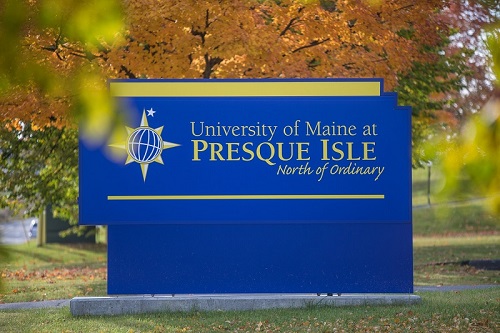Title III Strengthening Institutions Program grant allows UMPI to create
two new, high-demand bachelor’s degree programs, improve career readiness, and expand experiential learning offerings for students
The University of Maine at Presque Isle will receive one of the largest grants in its history this month following the U.S. Department of Education’s announcement that the University was selected for a 2019 Title III Strengthening Institutions Program grant worth nearly $2.25 million over a five-year cycle. The grant will allow UMPI to expand access to two new career pathways—in Computer Science and Health Administration—and develop stronger career readiness and experiential learning offerings for students. UMPI is one of only 64 institutions across the nation to receive this award.
“We are so pleased that UMPI has been selected for this highly competitive grant to complete this particular project over the next five years focused on providing greater access to high demand degree programs and ensuring that all of our students are career ready and get work experiences before they graduate,” UMPI President Ray Rice said. “Establishing Computer Science and Health Administration bachelor’s degree programs here will help us to better meet the workforce needs of our region and state while providing our students with new avenues for prosperous careers. And having the ability to simultaneously work on career readiness and experiential learning strategies will allow us to even better prepare our students for their future careers.”
The project, titled Expanding Access, Increasing Success, and Improving Career Readiness, includes $449,962 for the first year with the anticipation that the grant will be for 5 years, a total of $2,249,710. Title III grants help colleges to expand their capacity to serve low-income students. At UMPI, nearly 88% of students are recipients of some form of federal financial aid and almost two-thirds are low-income and receive Pell grants. The work involved in the grant project allows the University to better serve this student population and meet several goals established as part of its 2020 Strategic Plan, as well as University of Maine System strategic priorities.
“UMPI’s commitment to serving students and preparing work-ready graduates for careers in high-demand fields is bringing new resources and opportunities to Maine,” Dannel P. Malloy, Chancellor of the University of Maine System, said. “Student-focused innovation attracts investment and is one of the reasons why Maine’s public universities deliver unmatched quality and affordability.”
UMPI’s Strengthening Institutions Program grant will provide for a wide range of activities over the next five years. The University will hire new faculty to create the two new bachelor’s degree programs, with two concentration areas in each program: Software Development and Information & Data Management within Computer Science, and Community Health and Health Informatics within Health Administration.
According to WayUp, Computer Science entry-level jobs are one of the fastest-growing fields in Maine, with computer and information scientists earning an average salary of $100,660 per year. Salaries for software developers in Maine average $90,530, and such positions are expected to grow by 30% in the state by 2020.
In the area of Health Administration, 65% of health administration positions in Maine require a bachelor’s degree, with a median salary of nearly $69,000. The State of Maine anticipates 12% job growth over the next decade for health information managers, with a median income of $62,060.
In addition to new faculty positions in these high-demand, high wage career fields, the grant will fund a new computer lab, complete with Smart Classroom technologies and ergonomic student workstations, for each of the two new academic programs.
Grant funding will also allow for the implementation of University Experience courses that include life, career, and financial literacy modules and the hiring of a University Experience/Experiential Learning Coordinator. This coordinator will develop the University Experience courses and provide faculty training on how to incorporate NACE (National Association of Colleges and Employers) career readiness competencies into the curriculum throughout the college student life cycle. The coordinator will also work with faculty on incorporating experiential learning activities, such as internships and service learning, into humanities courses.
Additionally, the grant will allow for an increase in the number of online courses provided by UMPI, to include the YourPace competency-based education degree programs. These online courses allow adult students to complete degrees at their pace with six start dates throughout the year.
Finally, the grant will fund professional development for faculty and staff to travel to conferences related to Title III activities as well as campus workshops focused on best practices in designing experiential learning opportunities and ensuring career readiness for students as they prepare to graduate and enter the workforce.
“The Title III grant will be truly transformative for UMPI and our students,” Dr. Debbie Roark, UMPI Executive Director for University Advancement and External Affairs, who will also serve as the Title III Project Director, said. “We have an opportunity over these next five years to build and solidify UMPI’s reputation with respect to the student experience. These funds are dedicated to increasing access, improving the student experience, and providing our students with the tools they need to successfully transition from the campus to their careers upon graduation.”
About the Title III Program
The Title III Program is administered by the U.S. Department of Education and began as part of the Higher Education Act of 1965 as an effort by the U.S. Congress to assist colleges to expand their capacity to serve large proportions of low-income students. An important objective of the Title III Program is to help participating institutions improve and strengthen their academic programs and management, and strengthen their capacity to serve students.
